|
|
|
Sort Order |
|
|
|
Items / Page
|
|
|
|
|
|
|
| Srl | Item |
| 1 |
ID:
187731


|
|
|
|
|
| Summary/Abstract |
Third-wave democracies have massively adopted mechanisms of judicial review, notably constitutional courts, considered key institutions of successful democratic transitions. By preventing abuses of the constitution and safeguarding people’s rights, they act as a bulwark against the claims of potential autocrats. In Thailand, the 1997 democratic transition led to the adoption of a powerful constitutional court tasked with safeguarding democracy from the threats of populism, corruption, and authoritarianism. Yet since its inception, the court’s record has been puzzling. It has dissolved most, if not all, of the pro-democracy, anti-military political parties, dismissed all elected prime ministers, and paved the way for two military coups. In short, against established theories linking constitutional courts to democratization, the introduction of constitutional review in Thailand has led to democratic breakdown. To make sense of this puzzle, this article will investigate three variables of the court—strategic interests, ideologies, and institutional design—within the larger bureaucratic structure of the Thai state, to account for the anti-democratic behaviour of Thailand’s Constitutional Court. This piece considers materials in Thai and English.
|
|
|
|
|
|
|
|
|
|
|
|
|
|
|
|
| 2 |
ID:
145743
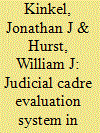

|
|
|
|
|
| Summary/Abstract |
Performance evaluation systems fundamentally shape the behaviour of Chinese judges, but scholarship on the concrete implementation of these institutions is scarce. Relying on nearly 15 months of fieldwork in six cities in China, we explain how the judicial cadre evaluation system, as unified by the 2011 “Guiding opinion of the Supreme People's Court,” has been implemented. Over 30 indices quantitatively measure Chinese courts’ “fairness” (gongzheng 公正), “efficiency” (xiaolü 效率) and “impact” (xiaoguo 效果), incentivizing court leaders to pressure their subordinate judges to resolve disputes as quickly as possible without unduly angering litigants or other actors. Under the hyper-quantified conditions of cadre evaluation, systemic praising and shaming bring about what we call “intra-state legibility,” which leads to a variety of informal worker reactions to these tactics. This study not only uses interviews and new documentary evidence to add necessary detail to our understanding of cadre evaluation systems, it also engages debates in comparative law and politics regarding bureaucratic influence on authoritarian judicial behaviour.
|
|
|
|
|
|
|
|
|
|
|
|
|
|
|
|
| 3 |
ID:
119709
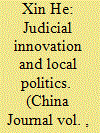

|
|
|
| 4 |
ID:
190407
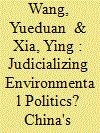

|
|
|
|
|
| Summary/Abstract |
Scholars consider deficient local accountability mechanisms a key shortcoming of China's response to environmental issues. Through empirical analysis of the new procurator-led public interest litigation (PIL) system, this study examines whether – and to what extent – this shortcoming can be remedied by empowering the juridical institutions. It concludes that thanks to the procuratorates’ political insider status, relative autonomy from local politics and extensive resources, procurators have generally found ways to maintain a delicate balance between holding executive agencies environmentally accountable and managing local governments’ resistance to the PIL system. However, reliance on top-down political support may ultimately hinder the expansion and stability of the procuratorial PIL system.
|
|
|
|
|
|
|
|
|
|
|
|
|
|
|
|
| 5 |
ID:
139559
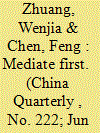

|
|
|
|
|
| Summary/Abstract |
The past few years have witnessed the revival of mediation as a chief method of labour dispute settlement in China. While the central government's campaign has reinvigorated the use of mediation in order to control social conflicts and maintain stability, its expansion and extensive deployment have also been driven by local authorities, as mediation can better serve their policy priorities and bureaucratic interests. Not only does the extension of mediation provide local bureaucratic agencies with flexibility and discretionary power to resolve conflicts without having to comply with legal minimums, it also legitimizes the courts' “non-legalistic approach” to settling dispute cases. The extensive employment of mediation by local authorities has chipped away at the role of legal procedures in settling labour disputes. The revival of mediation embodies a tension between the rule of law the government has promoted since the reform and the extrajudicial methods it needs for controlling conflicts.
|
|
|
|
|
|
|
|
|
|
|
|
|
|
|
|
| 6 |
ID:
168539
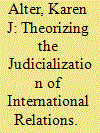

|
|
|
|
|
| Summary/Abstract |
This article introduces a Thematic Section and theorizes the multiple ways that judicializing international relations shifts power away from national executives and legislatures toward litigants, judges, arbitrators, and other nonstate decision-makers. We identify two preconditions for judicialization to occur—(1) delegation to an adjudicatory body charged with applying designated legal rules, and (2) legal rights-claiming by actors who bring—or threaten to bring—a complaint to one or more of these bodies. We classify the adjudicatory bodies that do and do not contribute to judicializing international relations, including but not limited to international courts. We then explain how rights-claiming initiates a process for authoritatively determining past violations of the law, identifying remedies for those violations, and preventing future violations. Because judicializing international relations occurs in multiple phases, in multiple locations, and involves multiple actors as decision-makers, governments often do not control the timing, nature, or extent to which political and policy decisions are adjudicated. Delegation—and the associated choice of institutional design features—is thus only the first step in a chain of processes that determine how a diverse array of nonstate actors influence politically consequential decisions.
|
|
|
|
|
|
|
|
|
|
|
|
|
|
|
|
|
|
|
|
|